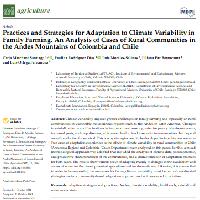Resumen
- Climate variability imposes greater challenges on family farming and especially on rural communities in vulnerable mountainous regions such as the Andes in Latin America. Changes in rainfall patterns and fluctuations in temperatures cause a greater frequency of extreme events, increased pests, and crop diseases, which even lead to food insecurity in communities that depend on self-production for survival. This is why strategies need to be developed to face this new scenario. Two cases of adaptation experiences to the effects of climate variability in rural communities in Chile (Araucanía Region) and Colombia (Cauca Department) were analyzed on this paper. For this, a mixed methodological approach was adopted that included the analysis of climate data, socioeconomic, and productive characterization of the communities, and a characterization of adaptation practices for both cases. The results show various ways of adapting mainly to changes in the availability and access of water for the development of agriculture and for domestic use. Likewise, it is shown that in order to be successful, the measures for facing climate variability must be part of coordinated strategies under a community-based adaptation approach and not developed in isolation.
